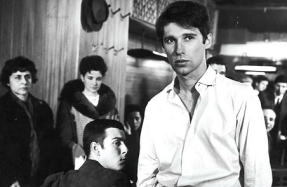Against Mythomania
Forty years after it made its debut at the Venice Biennale’s Austrian pavilion, Valie Export’s sculpture Gerburtenbett (“The Birth Bed”) now stands in London, where the Galerie Thaddaeus Ropac has recreated the artist’s original 1980 installation. The foundation of the piece is a large, metal-plated wedge bisected by a horizontal panel to form a platform, whose proportions and weight call to mind a mortuary slab. From this surface emerge two mannequin-like legs attached to a female pelvis, between which are two striplights of glowing, blood-red neon. The figure’s head, sunken into null space, has been replaced by a television set, on which screens a continuous loop of a priest issuing the rite of communion, accompanied by a sustained drone. There is no baby, and perhaps there never was; the equation is incomplete.
With its disembodied signifiers of femininity enmeshed in the trappings of consumer capitalism and technology, all of it presided over by a figure of traditional patriarchal authority, is both the culmination and exemplar of the practice that Export had been developing since her entry into the Vienna art scene in the mid-’60s—an arrival that marked an escape from the suffocating restrictions imposed upon her by a series of repressive social roles and institutions. Born Waltraud Lehner in Linz eight months after the beginning of the Second World War, Export was educated in a convent until the age of 14, and entered into marriage and motherhood during her study at Linz’s School of Applied Arts in the mid-’50s. Leaving her husband and entrusting her children to her sister, she decamped for Vienna and enrolled in the Design
You’re reading a preview, subscribe to read more.
Start your free 30 days





